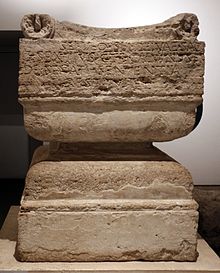[Greek] ἄγνωστος (agnōstos), [Latin] ignotus: unknown, unrecognizable, to be agnostic, unknowable; Acts 17:23

Epimenides of Crete, posed that there could still be an unknown good god who could forgive the Athenians’ treachery for slaughtering the followers of Cylon. The altar’s plaque stated, “To an Unknown God”.
Background Information:
Greek Hellenism: Man, through his senses, can know a god (deity). A god is unknowable only if that god is not accessible to the senses. Plato, Aristotle, and Xenophon used Theos as a personal name for the supreme God in their writings. Plato’s Timaeus 28c states that the Cosmos has come into existence for it is visible and tangible. Homer’s Illiad 22,9 shows Achilles pursuing Apollo without recognizing him. Xenophon’s Memorabilia 4.3.13 states one continues to praise and worship the gods because one can see their works. Stoicism states that the nature of God is essentially knowable. It is self-evident that a right knowledge is essential for man to live a right path.
Epimenides of Crete: He was a 5th century B.C. Greek prophet, poet, and contemporary of Aristotle and Plato. Epimenides is famous for coining the phrase “Unknown God” which Paul had referred to in Athens. Athens had earlier been subject to a curse (plague) for slaughtering the followers of Cylon. The oracle priestess said there was another unknown god who remained unappeased for their treachery. The Athens sought Epimenides who would know how to appease this offended god. Epimenides postulated that there must still be an unknown god good and great enough that it would smile upon their ignorance. Epimenides advised the elders to seek a sign from this unknown god. In his prayer, Epimenides pleaded for the unknown god to cause the sheep to lie upon the grass to be sacrificed. Epimenides also promised to acknowledge their pitiful ignorance of this unknown god’s name. Epimenides ordered stonemasons to construct altars on each animal’s resting place. The inscription “To an Unknown God” was placed on the altars. Within a week, the plague ended and the Athenians recovered.
Old Testament: Though not explicitly stated, the idea that God being unknown is certainly possible for heathens who do not know God. Adam and early man have received commandments from God. Israel knows God from its history. Israel does not know any other gods. Some atheists have doubted the existence of God. The Hellenistic philosopher Philo makes reference to atheists’ audacious and fabulous human inventions, asserting that there is no such thing as God.
I am the Lord, your God, since the land of Egypt; you know no God beside me (Hos.13:4). A curse for you if you do not obey the commandments of the Lord, your God, but turn aside from away from the way I ordain for you, today, to follow other gods, whom you have not known (Deut.11:28). Or new-created, wrathful, unknown beasts to breath forth fiery breath (Wis.11:18). You furnished the flaming pillar which was a guide on the unknown way (Wis.18:3). Devout priests hid it (fire) in the hollow of a dry cistern, making sure that the place would be unknown to anyone (2Macc.1:19).
New Testament: This term, meaning unknown, occurs once in Acts. Paul, in Athens, grew exasperated at the site of the city full of idols. Paul engaged in a discussion with philosophers who thought that Paul was promoting foreign deities ‘Jesus’ and ‘Resurrection’. Paul acknowledged that the Athenians were very religious. Paul saw the shrine with the altar inscribed with ‘To an Unknown God’. Paul proclaims that is God, whom they unknowingly worship, is the Lord of Heaven and earth. This God does not need to dwell in sanctuaries nor need to be served by human hands.
Scripture:
“For as I walked around looking carefully at your shrines, I even discovered an altar inscribed “To an Unknown God.” What therefore you unknowingly worship, I proclaim to you.” Acts 17:23
Paul attempts to reach common ground the Athenians’ desire to find God.
Conclusion:
Agnostic, ignore, ignorant
The ancient Greeks used their senses to understand their environment and their gods (deities). It interesting to see that the Stoics attempted to live by a moral compass. They perhaps may have not realized that these moral laws were based on God. Epimenides may also have been prophetic in drawing upon an unknown God who would later help the Greeks. Plato and his contemporaries were also on the cusp of understanding God.
It is interesting to note that Philo would talk about those who doubted or refused to acknowledge the existence of God. These opponents become a precursor to the ‘militant’ atheists (in our current culture) who would vehemently deny God using human inventions and pseudo-science.
It is ironic that the Greeks would worship an unknown God, despite their desire for knowledge and wisdom. Perhaps, this was out of desperation. However, this provides Paul with an opportunity to reach the Athenians’ desire to worship God. It is also interesting to note that Paul mentions “we are His offspring”. This quote is in reference to the poet Aratus (340-265 BC) who spoke of the power of Zeus. However, Paul was speaking that we are God’s offspring.
As often with my posts, I never know what I will discover!
